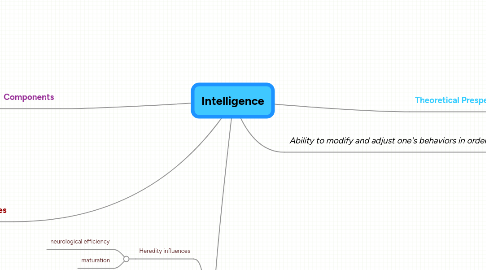
1. Aquired Through
1.1. Heredity influences
1.1.1. neurological efficiency
1.1.2. maturation
1.2. Environmental influences
1.2.1. home environment
1.2.2. early nutrition
1.2.3. toxic substances
1.2.4. early intervention
1.3. Prior experiences
1.3.1. exposure to a variety of situation
1.3.2. age appropriate opportunities
1.3.2.1. academic
1.3.2.2. fine/gross motor
1.3.2.3. social/emotional
1.3.2.4. problem solving
2. Components
2.1. Adaptive
2.2. Learning abilities
2.3. Use of prior knowledge
2.4. Culture specific
2.5. Cooridination of different mental processes
3. Questions/Critiques
3.1. Can theories be combined to determine intelligence?
3.2. Will it ever really be possible to accurately determine I.Q.?
3.3. I agree that intelligence changes with exposure and experiences
3.4. I don not believe that I.Q. scores should be the only way to determine intelligence in a person.
4. Theoretical Prespective
4.1. Spearman g Factor
4.1.1. General Factor
4.1.2. Specific Factor
4.2. Cattell- fluid and crystalized
4.2.1. Fluid - ability to acquire new knowledge and adapt quickly
4.2.2. Crystalized - knowledge ans skills gathered from experience and education
4.3. Gardner-multiple intelligences
4.3.1. Linquistics
4.3.1.1. use of language effectivly
4.3.2. Logical-mathical
4.3.2.1. logical reasoning
4.3.3. Spatial
4.3.3.1. notices details, mentally imagines and manipulates visual details
4.3.4. Musical
4.3.4.1. create, understand and appreciate music
4.3.5. Bodily-Kinesthetic
4.3.5.1. effectively uses body
4.3.6. Interpersonal
4.3.6.1. aware of others behaviors
4.3.7. Intrapersonal
4.3.7.1. aware of owns feeling, moives and desires
4.3.8. Naturalist
4.3.8.1. notices differences in objects and lifeforms
4.4. Sternberg-thiarchic theory
4.4.1. Environment
4.4.2. Proir experiences
4.4.3. Cognitive Processes
4.5. Distributed intelligence
4.5.1. Object use to complete a task
4.5.2. Supportfrom physical, social and cultural environments
